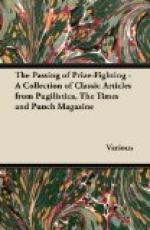Now, as most of the food that we eat
Is wanted for keeping us warm,
The requisite quota of heat
Is largely a question of form;
And the ratio of surface to weight,
As anyone readily twigs,
Is the root of the point in debate
As sagely expounded by SPRIGGS.
Hence the more we resemble a sphere
Less heat on the surface is
lost,
And the needful supply, it is clear,
Is maintained at less lavish
a cost;
’Tis economy, then, to be plump
As partridges, puffins or
pigs,
Who are never a prey to the hump,
So at least I interpret my
SPRIGGS.
Next, the harder it freezes or snows
The greater the value of fat,
And the larger the appetite grows
Of John, Sandy, Taffy and
Pat.
(Conversely, in Midsummer days,
When liquid more freely one
swigs,
Less viand the appetite stays—
This quatrain’s a gloss
upon SPRIGGS).
For strenuous muscular work
A larger allowance of grub
We need than is due if we shirk
Exertion, and lounge in a
pub;
For the loafer who rests in a chair
Everlastingly puffing at “cigs”
Can live pretty nearly on air,
So I gather at least from
my SPRIGGS.
Why children need plentiful food
He nextly proceeds to relate:
Their capacity’s larger than you’d
Be disposed to infer from
their weight;
They’re growing in bulk and in height,
They’re normally active
as grigs,
And exercise breeds appetite—
This stanza is absolute SPRIGGS.
Last of all, with an eloquent plea
For porridge at breakfast
in place
Of the loaf, and for oatcake at tea
A similar gap to efface;
For potatoless dinners—with
rice,
For puddings of maize and
of figs,
Which are filling, nutritious and nice—
Thus ends the Epistle of SPRIGGS.
* * * * *
[Illustration: Short-sighted Lady. “THAT’S RATHER AN AFFECTIONATE COUPLE.”
Her Friend. “THAT’S MY HUSBAND.” Short-sighted Lady. “OH, I’M SO SORRY.”
Her Friend. “AND I’M SORRY, TOO, FOR I SEE HE’S GOT HIS LIGHT OVERCOAT ON, AND I TOLD HIM NEVER TO WEAR IT WHEN BRINGING HOME THE COALS.”]
* * * * *
“The L.C.C. had decided
to grant only L5,300 amongst L21,000 teachers,
which would average a shilling
a head per week. (Shame!)”—Daily
Paper.
We agree. Why any War bonus at all to such bulging plutocrats?
* * * * *
“As I watched youths
obediently obeying the whistle I wondered what
football would be like after
the war.”—Daily Paper.
At present it seems rather redundantly redundant.
* * * * *




